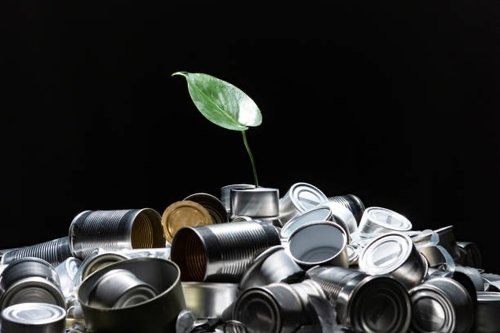The PPWR package: a long road towards adoption

Although an agreement was reached in trilogue on Monday night, one party still remains unsatisfied with the provisional deal: the Commission, whose absence on the traditional group photo raises concerns about the objective to finalise negotiations before the European elections in June 2024.
Although an agreement was reached in trilogue on Monday night, one party still remains unsatisfied with the provisional deal: the Commission, whose absence on the traditional group photo raises concerns about the objective to finalise negotiations before the European elections in June 2024.
On 4 March, after 9 hours of intense negotiations, the Parliament and the Council finally reached a provisional political agreement on the Packaging and Packaging Waste Regulation, during the third trilogue held on the file. Frédérique Ries, Rapporteur, welcomed this landmark agreement, that consecrates the EU’s efforts to set clear targets for reducing packaging consumption and boosting the use of recycled and reused packaging.
Overall, the provisional agreement preserves most of the sustainability requirements and targets initially proposed by the Commission, as well as provisions that were already agreed in the Plenary in November 2023. As such, the text maintains the general packaging reduction targets of 5% by 2030, 10% by 2035, and 15% by 2040, as well as the bans on the sale of very lightweight plastic carrier bags and the use of certain single-use packaging formats (such as the packaging for unprocessed fresh fruit and vegetables, individual servings of condiments and sugar, miniature toiletries, and shrink wrap used for suitcases in airports). It also sets the objective of making all packaging in the EU recyclable by 2030, while setting exemptions for lightweight wood, cork, textile, rubber, ceramic, porcelain, and wax. The Commission will also have to assess the proposed sustainability targets and criteria for bio-based plastics by the end of 2027, to boost the transition towards an oil-free EU economy.
To reduce the use of unnecessary packaging, co-legislators agreed to introduce a maximum empty space ratio of 50% for grouped, transport, and e-commerce packaging and called on manufacturers and importers to try and minimise the weight and volume of packaging, unless they produce protected packaging designs.
Furthermore, the deal maintains the 2030 and 2040 targets as regards minimum recycled content in plastic packaging: 0% by 2030, 15% by 2035, and 20% by 2040. However, it introduces exemptions for compostable plastic packaging and packaging with a plastic component under 5% by weight.
The co-legislators also secured the introduction of a ban on the use of PFAS in food contact packaging above certain thresholds and tasked the Commission to assess the need to amend that restriction within the four years following the entry into force of the regulation.
As regards reuse, the deal introduces binding targets for 2030 and indicative ones for 2040, notably for alcoholic and non-alcoholic beverages, transport and sales packaging, and grouped packaging. For now, cardboard packaging in transport has been exempted from these requirements. It is worth noting that the Member States will have the possibility to grant a five-year derogation from these provisions, under certain conditions. These targets do not apply to micro-enterprises and the deal gives the possibility for economic operators to constitute pools of up to five final distributors to meet the re-use targets on beverages.
Additionally, actors from the takeaway sector will be required to provide at least 10% of products in reusable packaging formats by 2030 and will not be able to use single-use plastics anymore after 2030. In order to promote a more sustainable approach in HORECA, consumers will also be allowed to use their own containers at restaurants and takeaway places.
Finally, when it comes to deposit return systems, the provisional deal includes the obligation for the Member States to ensure the separate collection of at least 90% of single-use plastic bottles and metal beverage containers by 2029, except if they reach a separate collection rate of above 80% by 2026.
Despite the agreement reached between the Council and the Parliament, doubts now remain about the Commission’s intention to sign the deal.
Indeed, the institution encountered a last-minute pushback from within its own trade department, motivated by growing concerns about the provision on recycled content present in the original text. This provision entailed that all companies selling their products in the EU had to source recycled content from within the EU, which could therefore contravene international trade rules and transpire as European protectionist measures.
As the Commission tried to change the text, it faced strong opposition from the Parliament and the Council, as well as the recycling sector, which saw the provision as a way to protect European producers of recycled materials against unfair competition from third-party countries, which might import recycled plastics of lesser quality on the EU market as a way to count towards the EU's recycling targets.
To remedy the situation, the co-legislators proposed to introduce a mirror clause for sustainability criteria, which would compel companies to abide by EU sustainability criteria for their recycled content to count towards their targets. For now, the Commission’s approval is still pending on this point and a resolution is expected to be reached at the political level in the coming days.
Should the Commission formally object to this proposal, the Council would need to approve the agreement unanimously. The agreement is expected to be voted in COREPER next Friday.
Beyond the Commission’s hesitation, the regulation might also encounter hurdles in the Parliament and the Council.
The Commission’s text, presented in November 2022, has long faced reluctance from a few EU Member States. Italy, together with Finland, issued a non-paper in December 2023, ahead of the adoption of the general approach by the Council. The document opposed the strict targets for the reuse of packaging and the requirements related to single-use packaging. This non-paper received signatures from nine other Member States, including Greece, Lithuania, and Hungary. Despite the engagement among Member States, Italy was the only country to vote against the Presidency’s compromise text. The general approach was thus adopted on 18 December 2023.
More recently, in February 2024, German Finance Minister Christian Lindner reportedly concluded a deal with his Italian counterpart, to vote against the Regulation. This informal agreement would come as an exchange value for Italy’s support to Germany’s efforts to block the negotiations on another file, the Corporate Sustainability Due Diligence Directive (CSDDD), in December 2023. The CSDDD final text failed to reach a qualified majority during the Coreper vote on 28 February 2024. The failure to reach a final agreement in the Council was notably attributed to the abstention of Germany and Italy, as their combined population accounted for nearly 32% of the total number of EU citizens, thus preventing the Council from reaching a qualified majority without the support of both countries.
As for the next steps, the PPWR package is yet to be endorsed. The agreement will also have to be formally adopted by the Parliament, which is expected to vote on the text during its last plenary session in Strasbourg, on 22 April 2024. Even though the closing of this file has been heavily anticipated ahead of the EU elections, green policy experts are warning that this process is likely to be longer than usual.
Indeed, while the proposal was fast-tracked before the European elections thanks to the corrigendum adoption procedure, it could still be rejected during the Plenary vote of 22 April and be presented again during the next Parliament’s mandate. In this scenario, the file would not undergo further reconsideration as the provisional agreement stage has already been reached. The upcoming changes in the European Parliament’s composition could thus play a role in the closing of the file. Lastly, the demonstrated opposition to the final text so far is likely to lead to a rollover of the file onto the next Parliamentary term.
